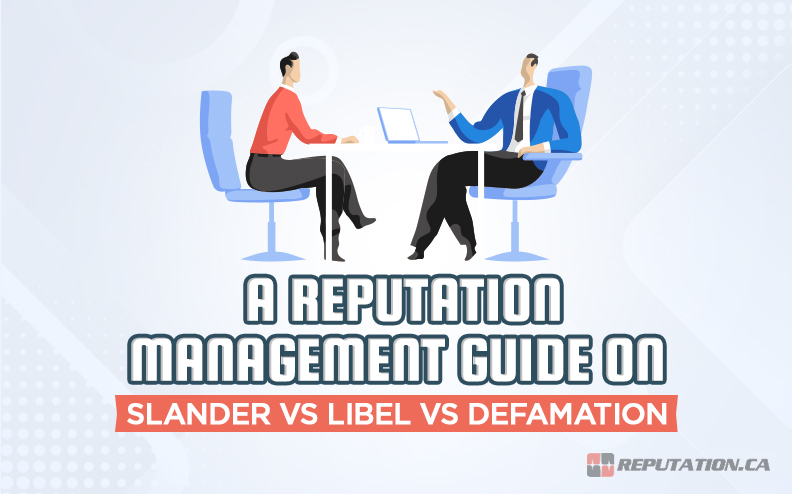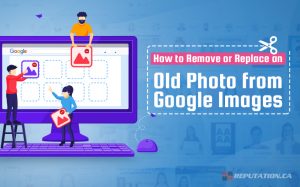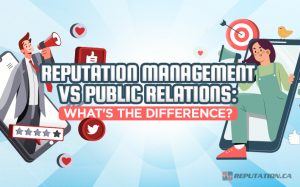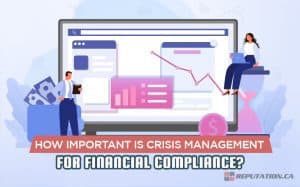The world of reputation management is all about two things:
- Removing false and defamatory statements from the internet, so they don’t hurt your reputation.
- Bolstering the positive reviews without resorting to false statements that can get your accounts penalized.
When identifying and removing negative reviews, you have to make a determination. Is the review legitimate, or is it false or fake in some way?
The way you handle these negative reviews will change depending on the answer.
Dealing with Legitimate Bad Reviews
Since it’s not the primary focus of this article, we’re going to discuss this in brief but not linger on the subject.
When you find a negative review, you need to determine whether or not it’s real. Signs that a negative review is real include:
- Actual, verifiable details of the customer’s transaction, such as a transaction number.
- The customer’s name is in your records as someone who purchased from you.
- You have an incident report, camera footage, or other evidence that verifies their statements.

If the review can be verified as a real, legitimate negative review, you then have to take steps to make things right. We have a guide on how to do that over here.
What happens if you cannot verify that the review is real? Well, you have to make a determination as to whether or not it is defamatory.
Defamation? Slander? Libel?
Three legal terms you often see tossed around are slander, libel, and defamation. All three are related and are relevant to reputation management, but the differences between them are very important.
First thing’s first: slander and libel are both different types of defamation. These are not three related concepts, but rather one category and two subcategories.
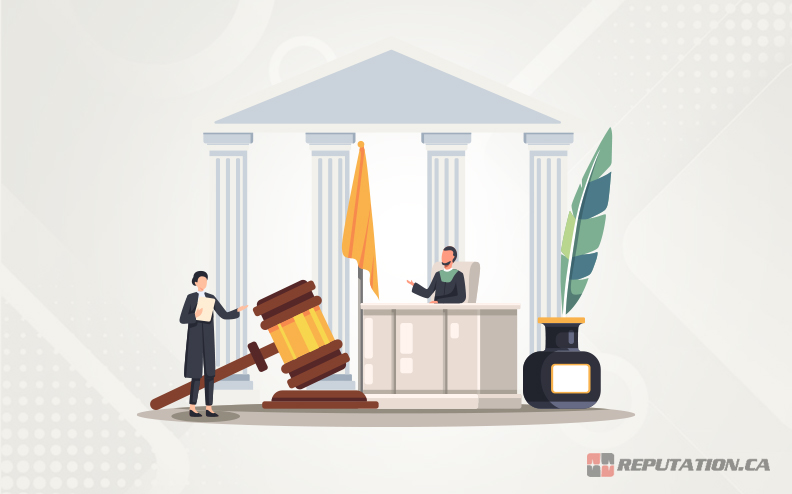
According to Legal Zoom:
“Defamation is a false statement presented as a fact that causes injury or damage to the character of the person it is about. An example is “Tom Smith stole money from his employer.” If this is untrue and if making the statement damages Tom’s reputation or ability to work, it is defamation. The person whose reputation has been damaged by the false statement can bring a defamation lawsuit.”
Defamation has a fairly strict definition, however, and not all negative reviews count as defamation.
Disclaimer: None of what we write in this post should be considered legal advice. If you believe statements or reviews left against your business may be considered defamatory, we highly recommend consulting a defamation lawyer prior to taking action. Additionally, if you want to take care of negative reviews that are not defamatory, or are borderline, reach out to us for our business or personal services today.
What is Defamation?
Compare these two statements:
- “Dave’s Crab and Steak House has sub-par food and terrible service.”
- “Dave’s Crab and Steak House serves horse instead of beef.”
There are two statements, but three outcomes here.

The first statement is an opinion and cannot be defamation. It cannot be empirically proven and is, rather, a statement of one person’s opinions on their experiences. The truth or falsehood of the statement can’t be rigorously proven, damages cannot be assigned, and any attempt to bring a lawsuit about it would fail.
The second statement can be considered defamation, if and only if it is not true. If the issue is investigated and it is found that the restaurant does indeed sell horse meat instead of beef, the statement is not defamatory. Conversely, if the investigation proves that the steaks are beef, the statement can be considered defamatory.
Note the language here: can be considered defamatory. Not is defamatory. This is because defamation requires more than just the falsehood of the statement.
Requirement 1: The statement must be a false statement of fact.
This is more or less what we’ve already mentioned; that the statement must have been made as if stating a fact. Opinions do not count as defamation, no matter how unfounded they may be.
Note that you cannot simply couch your statement in the language of opinion and have it count as opinion. Taking the statement above, simply saying “I think Dave’s Crab and Steak House serves horse instead of beef” does not suddenly change the statement into an opinion, at least not in a way that would protect you from defamation suits.

Usually, the line in the sand with regards to opinion is contextual. It has to do with the content of the statement, the specificity, and who and when you’re saying it. This is why defamation lawsuits are so tricky; it requires a complete contextualization of the statements being made.
Requirement 2: The statement must have been made to a third party.
The second requirement for a statement to be considered defamation is that it has to be made to a third party. For example, if an individual were to send a letter to the owner of Dave’s Crab and Steak House accusing them of serving horse meat, that letter is not defamatory. Conversely, if they published the letter as an “open letter”, or sent it to a media outlet, then it could be considered defamatory. Again, of course, only if the statement is indeed false.
Requirement 3: The statement must have been made in reckless disregard for the truth or with knowledge and intent to defame.
There are three possibilities here.
- The person making the accusation knew it was false when they made it.
- The person making the accusation disregarded evidence to make the claim.
- The person making the accusation made the claim without making an attempt to verify it.

These three possibilities can create a statement that is considered defamatory. On the other hand, if the individual making the claim can cite a reasonably reputable source for their claim, or has evidence (even if the evidence is false, if they didn’t know it), or made an attempt to verify the claim before making the accusation, it may not be defamatory.
There are a lot of maybes and mays in these above sections. This is because there’s a ton of wiggle room in these kinds of lawsuits, which is why they end up as lawsuits rather than simple charges and settlements. Much investigation must be done to discover the truth of the matter before a defamation suit can reach a conclusion.
Requirement 4: The statement must have tangible damages associated with it.
In order for a statement to be defamatory, it must have caused actual, tangible damages to the person or business. If a defamatory review causes lost customers for a business, it is defamation. If an individual loses their job because of a false statement, it is defamatory.

In some cases, this can be very hard to prove. A business might lose customers due to a bad review, but unless those customers state why they left, there’s no way to prove that the review was the cause.
Differing Standards.
Another issue that might come into play is that the standards for what is considered defamation vary depending on the individual or entity being accused. Someone making a defamatory statement against a private citizen has a different standard of proof than that same person making the accusation against a public figure or a business.
A note on the First Amendment
While we’re a Canadian business, many of our readers are in America and thus may have questions about the United States Constitution’s First Amendment, the right to free speech.
Commonly known as freedom of speech, this amendment protects the right of an individual to make statements of opinion and fact without repercussions. However, it is actually a lot more limited than many people believe. There are two major quirks of the amendment that are relevant to defamation.
- It’s still illegal to, for example, shout “fire” in a movie theater when no fire is present, because it’s not free speech; it’s endangerment of everyone involved.
- Freedom of Speech only applies to government censures. In other words, the government cannot act against you for your statements. However, a government official can act as an individual citizen to respond, and neither private citizens nor businesses have the same protection. Businesses are free to retaliate (for example, by banning a problem customer from their store or website).

Certain kinds of speech are exempted by the First Amendment, including obscenity, true threats, incitement, and commercial speech. These often have very strict definitions, as well, and must be proven to be used as a defense.
There are similar protections in Canada and around the world, though they usually have different connotations and definitions.
Defamation “Per Se”
In legal terms, “Per Se” means something like “intrinsically”, “obviously”, or “by itself.” A statement that is defamatory “per se” means that the statement is so obviously defamatory that it does not need further contextualization or evidence to be considered defamatory.
What About Slander and Libel?
We’ve spent the bulk of this post so far talking about defamation, but what about Slander and Libel? Where do they fall into the spectrum of defamation?
The first thing to know about slander and libel is that they are both forms of defamation. They differ in one key way, however.
- Libel is tangible, while Slander is intangible.
What does this mean?

Libel is tangible, meaning it takes the form of permanent or semi-permanent writing. Writing in a print publication, in a book, in pictures, in blog posts, in social media posts, in business reviews, and other forms of the written word can be considered Libel if it is defamatory.
Conversely, Slander takes the form of words and gestures. Standing on a podium and delivering a speech where you defame someone or a business is slander.
The two can be related. Someone giving a speech can be accused of slander; publishing the text of the speech on their website can also be accused of libel.
Using Slander and Libel for Reputation Management
So, how does all of this tie back into reputation management?
When a bad review is left about your business or your person, the first step is to determine the truth and accuracy of the statement. If the statement is false, it can be checked to see if it meets the criteria for defamation.
Reputation managers can then use the threat of a defamation lawsuit to try to have the negative review removed. In general, there are three possible outcomes to this process.
- The threat will be ignored or refuted by the site hosting the review most often. Sites like TheDirty or PissedConsumer typically ignore anything short of an actual court order to remove content.
- The threat will be taken seriously and the offending content removed. This is generally the best outcome. Sites like Yelp or TrustPilot, for example, may remove a review that appears defamatory upon receiving notice that you are considering legal action. They want to save the time and effort of a legal battle and would rather remove the content and move on.
- The threat will be taken seriously but defended. In these cases, you will be given the choice; do you pursue legal action, or do you drop it for other methods? If the statement is truly defamatory, you can pursue a lawsuit. If it’s likely not, or you’re not confident enough in your case, you can drop it.
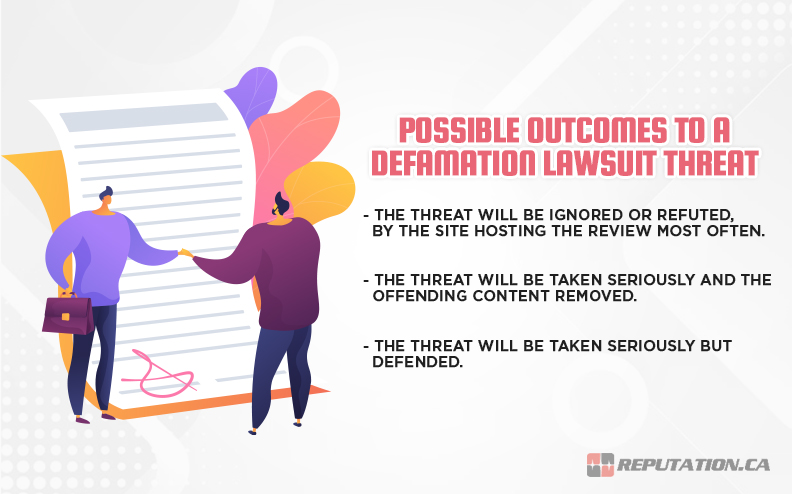
Often, using the threat of a defamation lawsuit is one of many tools in the reputation manager’s bag of tricks. The legal threat is enough to get many borderline-defamatory reviews removed, and in the cases of real, tangible defamation, your business can even potentially be awarded damages.
If you or your business have been the victim of what you believe to be a defamatory statement, made either as libel or slander, it might be worthwhile to dig deeper. Contact us for a consultation into your situation and to determine whether or not you have the grounds for a defamation case. You may be able to have the statements removed or possibly even win damages for the case. Additionally, if you have any questions or concerns regarding the topic, please feel free to reach out at any time.




